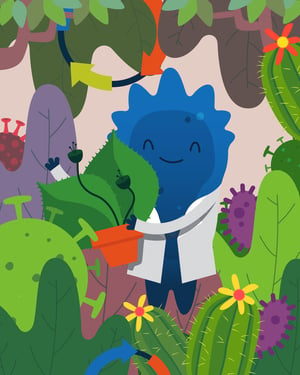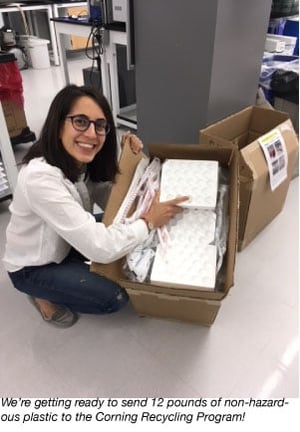Anyone who works in a lab is familiar with the alarming amount of waste that is generated. This is a systemic problem that we need to address, but is often ignored in the lab environment.

I recently attended the Go green! Innovative practices for laboratory waste symposium, sponsored by New England Biolabs and Labconscious. I was eager to learn about practices I could bring both to Addgene, and share with my peers. In fact, there was so much useful information that I decided to write a few blog posts. This first post will be based on recycling!
With the popularity of single-use items, plastic is a substantial portion of lab waste. Despite the fact that researchers represent a minority of the world’s population, we account for an estimated 2% of global plastic generation. Less than 9% of plastics are ever recycled, so adopting a few meaningful changes in the lab could make a big difference in our global impact as scientists. Many scientists are already leading the cultural change toward responsibility in our lab’s environmental impact, but we can all do more to make research more environmentally friendly. Adopt one or all of the recycling practices below.
Reuse lab cooler boxes
Some vendors take back their expanded polystyrene (a.k.a. Styrofoam or cooler boxes). We get these boxes a lot when receiving temperature-controlled reagents. Expanded polystyrene will likely end up in a landfill, but at least we can reduce the rate at which that happens and reduce the manufacturing of new containers, which is associated with CO2 emissions.
-
NEB takes back expanded polystyrene boxes for free (in the U.S.). Their cooler boxes come with a prepaid return shipping label. To return the box, simply peel your address sticker off the box, remove the ice pack (it’s not recyclable), tape the box shut, and drop off the box at any location where the United States Postal Service picks up mail. NEB actually started this program in 1976!
-
Millipore Sigma takes back expanded polystyrene boxes for free (in the U.S.). After you receive your order, put the empty cooler box back in its box, flip the flaps of the box so the pre-paid postage stamp is on the outside of the container, and drop off the box at any location where the United States Postal Service picks up mail.
 Recycle plastic packaging
Recycle plastic packaging
Packaging is a huge contributor to the increase in plastic manufacturing, accounting for 40% of total plastic usage (Geyer et al., 2017). While most single-stream or city recycling services don’t offer plastic recycling, specialized companies can recycle plastic-- you just have to find them (or keep reading).
Corning takes back and recycles a lot of their plastic packaging (from Corning®, Falcon®, or Axygen® product packaging) for free! It has to be from their company and it has to be packaging (no coated tissue culture plates, for example). Check the link for more details on what they accept and to print a free shipping label.
Recycle nitrile gloves
Terracycle is a company that takes items not commonly accepted at recycling facilities. Your lab can buy a box with the prepaid label and fill it with nitrile gloves, affix the prepaid label, and divert these gloves from the landfill by sending them to be recycled. This service does cost money, but your institute may still be interested as it offsets the cost of regular waste services. Learn about how to start a glove recycling program at your institute!
What should I do in the lab to help the environment? Well, you could:
-
Collect the NEB and/or Millipore Sigma boxes from your lab or department and send them back to the companies for reuse. They’re really easy to spot and even easier to ship back. Be that person!
-
If you use serological pipettes from Corning®, Falcon®, or Axygen®, set up a bin or box in your tissue culture room for the wrappers and ship them back.
-
Start a glove recycling program at your institute! Universities and companies have the potential to make a huge impact directly on waste, but also on culture. Encourage your workplace to become a leader in sustainability.
-
Sign up for blog posts and updates from Labconscious.
If you’re inspired by this post then I challenge you to take to action! These days, it’s important for individuals, companies, and universities to be sustainability leaders. Take initiative to bring ideas to your workplace and you could end up making a huge impact on how waste is handled. A lot of places have small or non-existent sustainability offices, so it’s up to all of us to work on this issue. Be a champion for this important cause!
To get more lab sustainability tips, check out our other articles in this series:
- Bringing Sustainable Practices to the Lab: Innovations
- Bringing Sustainable Practices to the Lab: Easy Action Items
References
Geyer, Roland, Jenna R. Jambeck, and Kara Lavender Law. "Production, use, and fate of all plastics ever made." Science advances 3.7 (2017): e1700782. PubMed PMID: PMID28776036. PubMed Central PMCID: PMC5517107.
Additional resources on the Addgene blog
- Subscribe to the Addgene blog
- Find lab tips for your research
- Read another blog post about conservation in the lab
Resources on Addgene.org
- Sign up for our quarterly newsletter
- Help other scientists save resources by sharing plasmids
- Find plasmids at Addgene
Topics: Addgene News





Leave a Comment